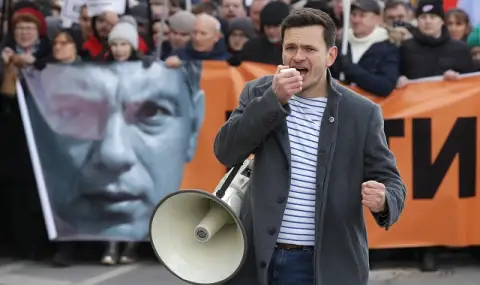They continue to believe that a free Russia is possible in future. And also at the end of the war in Ukraine. In "Deutsche Welle" in Bonn, three Russian opposition activists spoke about the exchange of prisoners.
"Surreal” - this is how the Russian oppositionist Andrey Pivovarov describes everything that happened in the last hours and days. In July 2022, he was sentenced to four years in a penal colony in his home country. The accusation - he was the head of an "undesirable organization". We are talking about the "Open Russia" critical of Putin. Now Pivovarov sits in the editorial office of "Deutsche Welle” in Bonn, and next to him are two other Russian oppositionists - Ilya Yashin and Vladimir Kara-Murza.
"A few days ago we were all alone, each of us in our little cell, and now we see so many people”. Nearly 100 journalists and citizens attended the press conference.
Never turn your back on your homeland
The last few days have been exhausting for the three men and the other prisoners released in the exchange. On Thursday evening they flew to Ankara and then arrived at Cologne-Bonn Airport. Of course, it's nice to be free again, says Pivovarov. However, his thoughts are still in Russia - with all the other innocent prisoners. The opposition asks journalists to never turn their backs on their homeland, even if a tyrant rules it.
"Many people in Russia are invisible, those who think differently than Putin. This notion that we are all sitting in a fortress has to go,” said Pivovarov. And he calls on the people of Germany to turn their attention again to the people of Russia.
"I will return to a free Russia”
"I feel like I'm in a movie for the second day already. Just a few days ago we were in isolation cells, now we are at a press conference on the banks of the Rhine,” says Vladimir Kara-Murza, who was also released from a Russian prison. He is a politician and journalist who survived two poisoning attempts and was sentenced to 25 years in prison for his criticism of Russia's war of aggression in Ukraine.
Kara-Murza says each of the released prisoners was accompanied by a Russian secret agent. "My companion looked at me and said - "Look around. You will never see your homeland again.”. But I told him that I was sure that I would return to Russia - to a free Russia.
"I understand how difficult it is to let a murderer go free”
The third released prisoner - Ilya Yashin, thanked the German government. Yashin, 41, was close to Russian opposition figure Boris Nemtsov, who was assassinated in 2015, and a friend of Alexei Navalny, who died in a Russian penal colony in February. At the end of 2022, Yashin was sentenced to eight and a half years in prison for criticizing Russia's war against Ukraine.
He also talks about the few words exchanged with German Chancellor Olaf Scholz at the airport. "I turned to him and told him that I know how difficult it is to let a murderer go free. In exchange for the murderer, you get innocent people who have not committed any crime. In exchange for a total of 16 people who were in Russian and Belarusian prisons, the so-called "Tiergarten Killer” Vadim Krasikov was one of those released. He was sentenced to life in prison and was serving his sentence in Germany after shooting Chechen-Georgian Zelimkhan Khangoshvili in Berlin. Now Putin received him personally in Moscow.
"Putin's propaganda is a lie!”
Yashin said he understood the Germans' long hesitation about this exchange. "Nothing is easy in a democracy. It's easy only for dictators. And he quotes a sentence from the Jewish Talmud, made famous thanks to Oskar Schindler: "He who saves one life saves the whole world." Yashin also says that his time in prison actually strengthened him: "I received so many letters that strengthened my faith in humanity. Putin's regime is not Russia. Putin's propaganda is a lie!”.
Yashin emphasizes that he did not want to be exchanged: "I did not want to leave Russia because I see myself as a Russian patriot. I perceived my imprisonment as a struggle for my rights in my country." He sees his arrival in Germany not as the result of exchange, but as exile. His voice breaks for a moment before he says: "I can't accept it: when someone says they can't leave their country, they throw them in jail."
And he talks about his feelings after the stopover in Turkey: "My first wish in Ankara was to buy a ticket and return to Russia." However, a Russian intelligence officer told him that if he did, his days would end like Navalny's. And Navalny died in February of this year at the age of 47 in a penal colony in the Arctic. The exact circumstances of his death have not yet been clarified.
